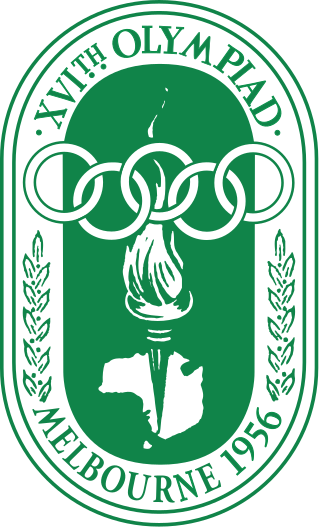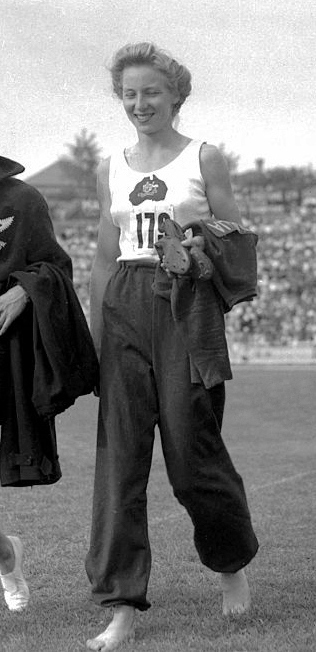
The 1956 Summer Olympics, officially the Games of the XVI Olympiad and officially branded as Melbourne 1956, were an international multi-sport event held in Melbourne, Victoria, Australia, from 22 November to 8 December 1956, with the exception of the equestrian events, which were held in Stockholm, Sweden, in June 1956.

Shirley Barbara de la Hunty AO, MBE, known as Shirley Strickland during her early career, was an Australian athlete. She won more Olympic medals than any other Australian in running sports.
The women's 100 metres hurdles at the 2004 Summer Olympics as part of the athletics program were held at the Athens Olympic Stadium from August 22 to 24.

Australia was the host nation for the 1956 Summer Olympics in Melbourne, Australia. However, due to Australian quarantine restrictions the equestrian events were held in Stockholm, Sweden. 294 competitors, 250 men and 44 women, took part in 140 events in 18 sports.
Norma Claire Thrower is a retired Australian hurdler. The South Australian hurdler ran for the Western Districts club in Adelaide.
Pamela Kilborn-Ryan, AM, MBE is an Australian former athlete who set world records as a hurdler. For three years, she was ranked as the world's top woman hurdler.

The United States competed at the 1956 Summer Olympics in Melbourne, Australia. 297 competitors, 251 men and 46 women, took part in 139 events in 18 sports.

The men's discus throw was an event at the 1956 Summer Olympics in Melbourne, Australia. Twenty athletes from 15 nations competed. The maximum number of athletes per nation had been set at 3 since the 1930 Olympic Congress. The qualifying round and the final both were held on Tuesday November 27, 1956. The event was won by Al Oerter of the United States, the nation's second consecutive and ninth overall victory in the men's discus throw. It was the first of four straight gold medals for Oerter. The United States earned its second medal sweep in the event, as Fortune Gordien took silver and Des Koch took bronze. Gordien became the fifth man to win two medals in the event, and the first to do so in non-consecutive Games. Italy's three-Games medal streak in the event ended.

The men's 110 metres hurdles was an event at the 1956 Summer Olympics in Melbourne, Australia. There were 24 athletes from 15 nations. The event took place on 27 and 28 November 1956. The maximum number of athletes per nation had been set at 3 since the 1930 Olympic Congress. The event was won by Lee Calhoun of the United States. It was the fifth of nine consecutive American victories, and the 11th overall gold medal for the United States in the 110 metres hurdles. It was also the third of four consecutive American podium sweeps, and the seventh overall sweep by the United States in the event.
The men's 100 metres event at the 1956 Olympic Games in Melbourne, Australia, was held at the Melbourne Cricket Ground on 23 and 24 November. Sixty-five athletes from 31 nations competed; each nation was limited to three athletes. The final was won by American Bobby Morrow, marking the fifth consecutive victory by a different American. Hec Hogan of Australia won that country's first medal in the event since 1900. The competition took place in strong winds, with the final run into a 2.5 m/s (5.6 mph) headwind.
Stephanie Storp is a retired female shot putter from Germany. Her best performance was winning the bronze medal at the 1997 World Championships, with a throw of 19.22 metres. She also won the silver medal at the 1993 World Indoor Championships, and represented her country in the Summer Olympics of 1992 and 1996. She ended her athletics career in 1998, having taken up basketball as a new sport.
The women's 100 metres was an event at the 1992 Summer Olympics in Barcelona, Spain. There were a total of 55 participating athletes, with seven qualifying heats. The top four in each heat qualified for the quarterfinals along with the four fastest remaining.
The Women's 200 metres at the 1952 Summer Olympics took place on July 25 (heats) and July 26 (final) at the Helsinki Olympic Stadium. Australian athlete Marjorie Jackson, who had already won the final in the 100 metres event, earned a second gold medal while setting two world records along the way.
The Women's 80 metres hurdles at the 1952 Summer Olympics took place on July 24 and July 25 at the Helsinki Olympic Stadium. Australian athlete Shirley Strickland de la Hunty earned the gold medal, setting new World and Olympic records.
The women's 200 metres competition at the 1956 Summer Olympics in Melbourne, Australia was held at the Olympic Stadium on November 29–30. The winning margin was 0.3 seconds.
The men's 400 metres hurdles competition at the 1956 Summer Olympics in Melbourne, Australia took place on November 23–24 at the Melbourne Cricket Ground. There were 28 competitors from 18 nations. The maximum number of athletes per nation had been set at 3 since the 1930 Olympic Congress. The event was won by Glenn Davis of the United States, the nation's fourth consecutive and ninth overall victory in the men's 400 metres hurdles. Eddie Southern (silver) and Josh Culbreath (bronze) completed the American sweep, the third time that the United States had swept the medals in the event.
The women's 100 metres hurdles at the 2015 World Championships in Athletics was held at the Beijing National Stadium on 27 and 28 August.
These are the results of the 2018 IAAF Continental Cup, which took place in Ostrava, Czech Republic on 8–9 September 2018.

The women's 4 × 400 metres relay at the 2019 World Athletics Championships was held at the Khalifa International Stadium in Doha, Qatar, from 5 to 6 October 2019. In the final the Jamaican team were initially disqualified, but were reinstated as the bronze medallists upon appeal.

The women's 400 metres hurdles at the 2022 World Athletics Championships was held at the Hayward Field in Eugene, Oregon, United States, from 19 to 22 July 2022. It was won by Sydney McLaughlin in a world record time of 50.68 seconds. The winning margin was 1.59 seconds which as of 2024 stands as the greatest winning margin for the women's 400 metres hurdles at these championships.








